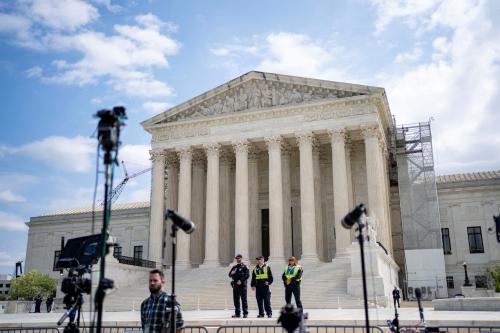Recent high-profile indictments have thrown the spotlight onto an obscure yet profoundly influential aspect of America’s criminal justice system: prosecutorial discretion. This power, held by prosecutors and cloaked behind the veil of constitutional authority, plays a pivotal role in shaping the landscape of justice across the country. Each year, more than 2.3 million felonies and 10 million misdemeanors are handled by over 2,300 individual prosecutor’s offices, but these crucial decisions are largely made outside the watchful eye of the public’s scrutiny. Prosecutors control secret grand jury proceedings, determine who will face prosecution, and decide the specifics of charges. They operate within a labyrinthine legal framework, armed with the threat of lengthy mandatory minimum sentences. This creates strong incentives for defendants to agree to lesser charges, even for crimes they did not commit.
More than 90% of both federal and state court cases are resolved through plea bargaining, sidestepping the courtroom entirely. This confluence of autonomy, secrecy, complex laws, and powerful sentencing tools endow prosecutors with enormous leverage, leading critics to question whether this power is wielded too selectively and relentlessly, undermining the right to a fair trial, fostering mass incarceration, and eroding what’s left of the public’s faith in equal justice. Without thorough insights into prosecutorial decision-making, can we truly foster a justice system that embodies fairness and equity? As we grapple with these concerns, we must understand that scrutiny of this largely unseen force is not just about holding power to account; it is a necessary step toward ensuring a truly just and fair system.
While we contend with these figures, the intricacies of a prosecutor’s decision-making process remain largely unexplored, leaving a significant knowledge gap. In an era when calls for justice transparency have reached the highest level, we can no longer overlook an element that silently sways the justice landscape, shaping case outcomes and sacrificing members of low-income, Black, and brown communities.
Black defendants in particular disproportionately bear trial penalties (the risk of receiving a harsher sentence for exercising one’s right to trial), overcharging, and over-prosecution. A sobering study found that Black individuals received sentences nearly 10% longer than their similarly situated white counterparts, a disparity directly linked to prosecutor charging decisions. The initial charging process, often overlooked in previous examinations, has a significant influence on individual case outcomes. Recognizing this pressing issue, we undertook a study that aimed to highlight the implications of this decision-making process and the interaction effects of the charging process with other factors, such as a defendant’s racial classification.
Unveiling startling findings, our study showed that defendants who were formerly charged without grand jury involvement were more likely to be convicted than those who were indicted by grand juries. This trend became even more pronounced in the case of Black and Latinx defendants. Our research confirmed that prosecutorial decision-making considers multiple factors during the charging process, including offense type and severity. Alarmingly, the study also highlighted persistent disparities in the criminal legal system that disproportionately impact Black and Latinx defendants. When swayed by stereotypes, such as perceived criminality, prosecutorial decisions become the crucible in which the fates of Black and Latinx defendants are sealed.
A surprising finding of our study is that Black defendants who were formerly charged without a grand jury, despite being more likely to be convicted, were also more likely to be granted deferred adjudication. This practice allows a judge to provide the defendant with an opportunity to avoid formal conviction by meeting certain requirements, such as completing community service or a rehabilitation program. In stark contrast, this was not the case for Latinx defendants, despite the increased likelihood of case dismissal for this group when charged without a grand jury indictment. These findings underscore not only the significant influence of case processing decisions on case outcomes but also the disparate ripple effects of these decisions across different groups.
An increasingly troubling facet of prosecutorial decision-making and a major concern for advocates of social justice is the potential for misconduct. Official misconduct by both police and prosecutors contributed to nearly 60% of exoneration cases since 1989. Such misconduct can adopt many faces: a prosecutor might hide evidence that could absolve the defendant, a practice known as “Brady violations”; they might unduly influence witnesses, pushing them to exaggerate or fabricate testimonies; or they might cross boundaries during the trial by making misleading statements to the jury. Such actions have become commonplace, leading to wrongful convictions and playing a part in approximately 30% of wrongful conviction cases that have led to exoneration. Despite these unsettling figures, only 4% of prosecutors face repercussions for their actions, painting a grim portrait of a system in which misconduct often remains unaddressed.
As we traverse this complex landscape of prosecutorial discretion, it is crucial to scrutinize various facets of prosecutor decision-making to pinpoint biases and identify where disparate effects are most acutely felt. Our recent study underscores the importance of decision-making in the charging process and the profound role prosecutors play in shaping case outcomes. We must persistently scrutinize how these decisions are made to identify and implement measures that can reduce disparities within the criminal legal system resulting from prosecutorial discretion. To this end, we propose the following imperative actions:
- For minor offenses and individuals who are likely to receive deferred adjudication, diversion at the preliminary hearing should be the default course of action. This would not only reduce the unnecessary burden on the individual and court systems, but also foster a more proportionate response to minor offenses, shifting away from formal charges toward more rehabilitative solutions.
- Legal representation should be made available from the onset of early case processing, including during charging decisions. This would ensure that defendants are equipped with the necessary support and guidance to navigate the complex legal process, thus safeguarding their rights and promoting fair outcomes.
- Transparency in the early-case processing outcomes, including the charging phase, should be significantly increased. This bolsters public trust and confidence in the criminal justice system. Moreover, making information about early case-processing outcomes and charging decisions readily available to the public would foster accountability and enable better scrutiny of potential biases and disparities.
- Thorough research should be conducted to understand the extent to which charging decisions are influenced by police behavior. Such an examination would not only shed light on potential biases and practices that need rectification but also inform evidence-based policies that promote equitable outcomes.
Reforming our prosecutorial system is no longer just a proposition—it is an urgent imperative, a rallying cry that reverberates across the arc of justice, demanding immediate, transformative action. This is not about making incremental adjustments or tweaking the system; it is a clarion call for a seismic shift in our prosecutorial decision-making framework.
The broader societal impact of this reform cannot be overstated. The credibility of our justice system, the public’s faith in our institutions, and the stability of marginalized communities are directly tied to prosecutorial discretion. We must galvanize our collective will and engineer a prosecutorial system that embodies unassailable justice—a justice unaffected by the variables of race, ethnicity, or economic status. Inaction or complacency is a luxury we cannot afford. Let us seize this moment, embrace the challenge, and forever transform the landscape of justice in our nation.



Commentary
Reforming our prosecutorial system is no longer just a proposition—it is an urgent imperative
June 29, 2023